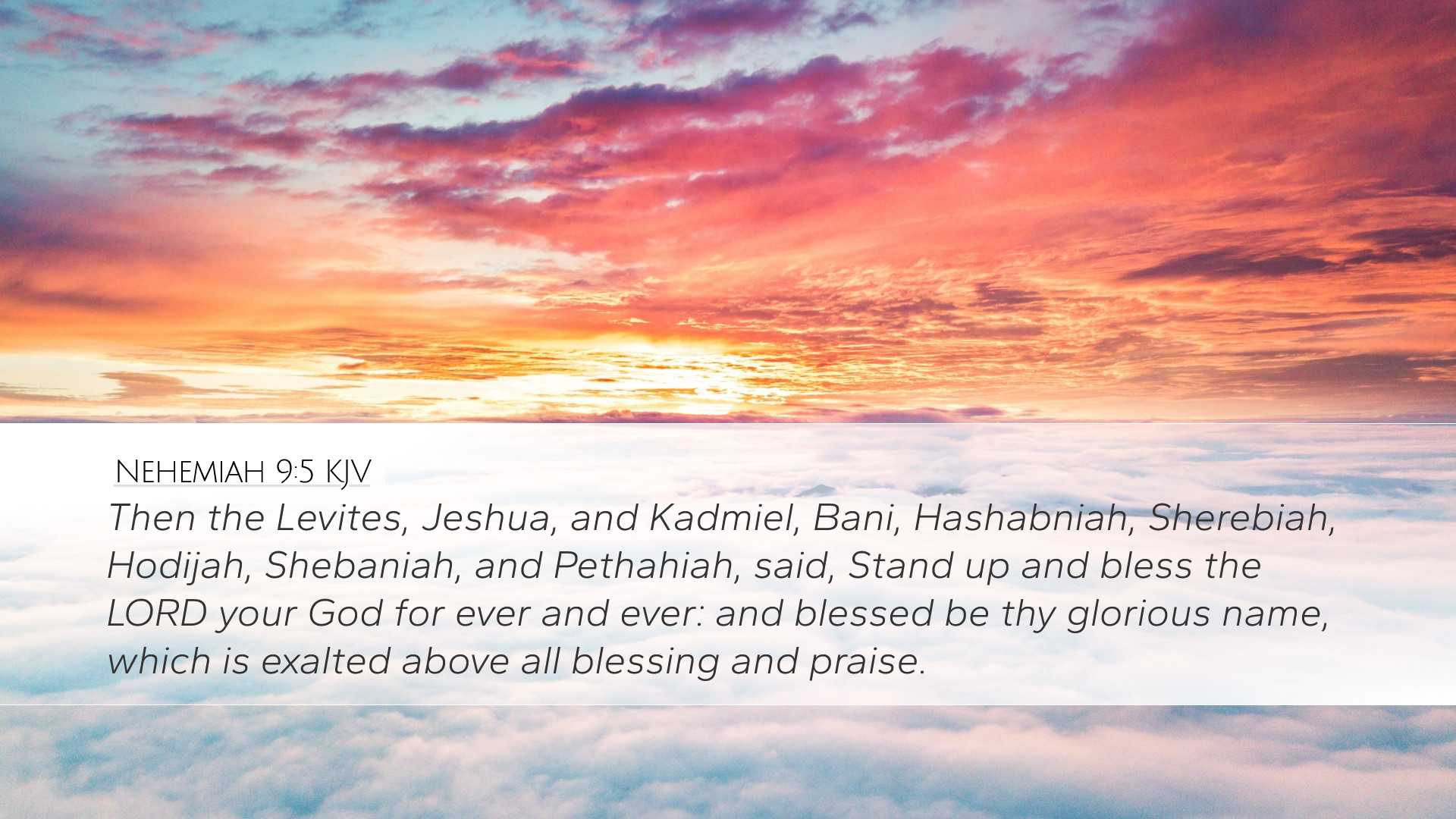Commentary on Nehemiah 9:5
Nehemiah 9:5 states:
"And the Levites, Jeshua, and Kadmiel, Bani, Hashabniah, Sherabiah, Hodijah, Shebaniah, and Pethahiah, said, Stand up and bless the Lord your God for ever and ever: and blessed be thy glorious name, which is exalted above all blessing and praise."
This verse comes during a significant moment in the history of Israel, as the people gather to confess their sins and seek restoration before God. This reflection highlights the liturgical and theological importance of the moment.
Context and Historical Background
The context of Nehemiah 9:5 falls within the larger narrative where the returned exiles are gathering to administer a corporate confession. The nation, having experienced restoration from Babylonian exile, is acknowledging God’s mercy, faithfulness, and the pivotal moments of their ancestral history.
Commentators like Matthew Henry emphasize the communal nature of this event, noting that it serves as a form of corporate worship. It reflects a collective desire to honor God amidst the reality of past failures.
The Role of the Levites
The Levites' role in this passage is crucial. Adam Clarke elaborates on how they act as mediators between God and the people, leading them in worship. Their call to "Stand up and bless the Lord" signifies a shift from personal reflection to public proclamation, guiding the assembly in recognizing God's greatness.
The Levites are strategically named here to demonstrate their importance in Israelite worship, embodying the responsibility they carry as spiritual leaders. Albert Barnes notes that their leadership underscores the continuity of worship practices established by previous generations.
The Significance of God’s Name
The phrase “blessed be thy glorious name” encapsulates theological depth. Matthew Henry explains that God's name represents His nature, attributes, and reputation. Blessing God's name is an acknowledgment of His majesty and sovereignty. The phrase “exalted above all blessing and praise” reflects the idea that God's worthiness transcends any human expression of praise.
Adam Clarke further asserts that this notion of God's name being exalted above all highlights the inadequacy of human language to fully encapsulate the divine nature, yet the act of blessing becomes an opportunity for the faithful to express gratitude and honor.
The Imperative to Praise
The command to “Stand up and bless the Lord your God for ever and ever” serves as an imperative for worshippers. Albert Barnes comments on the dynamic nature of worship, showing that it involves an active response from believers, both in body and spirit, illuminating the importance of physical posture in worship as a reflection of spiritual attitude.
Worship as a Response
Worship is fundamentally a response to God's revealing of Himself. The Levites lead the people in this profound acknowledgment. According to Matthew Henry, the act of standing signifies readiness to engage in worship and signifies respect and reverence towards God.
Timeless Relevance
This verse holds timeless relevance, demonstrating that the act of worship, as led by spiritual leaders, is essential in any faith community. Adam Clarke indicates that these moments of corporate worship serve as critical reminders of God’s character, generating both personal and communal transformation.
Practical Implications for Today’s Church
- Leadership in Worship: Church leaders should actively facilitate and guide congregational worship, emphasizing the importance of corporate acknowledgment of God’s greatness.
- Theology of Worship: Understanding worship as a response to God's nature transforms the approach to congregational gatherings, focusing on the attributes of God rather than just on the needs of the congregation.
- Posture in Worship: Physical postures in worship, such as standing, can enhance spiritual engagement and illustrate reverence and readiness to serve God.
Conclusion
Nehemiah 9:5 not only reflects a historical moment in Israel's return from exile but also serves as a rich source of theological insight regarding worship, community, and the nature of God. As believers and leaders engage with this text, they are reminded of the enduring significance of blessing God's name and the importance of corporate worship in acknowledging His glory.


